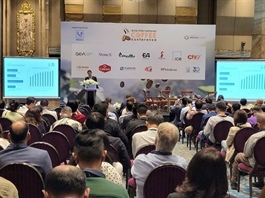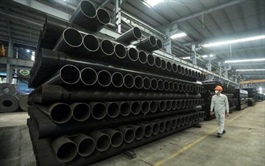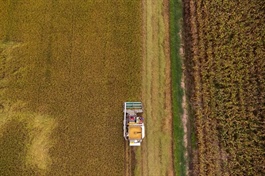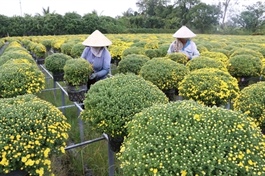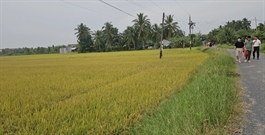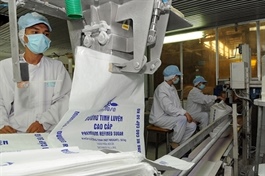Ensuring origin of lobster seeds a must to export to China
Ensuring origin of lobster seeds a must to export to China
Việt Nam needs to establish a value chain for spiny lobster with a focus on meeting China’s requirements regarding the origin of seeds and farming process to export into this market.
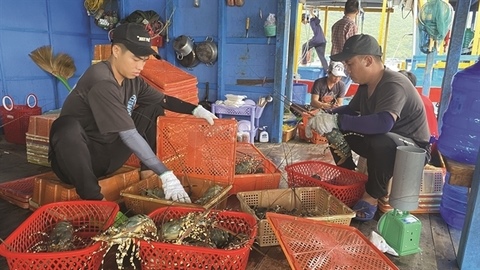
A sustainable value chain for spiny lobster is critical for Việt Nam to export to China. — VNA/VNS Photo |
Recent changes in China’s requirements for lobster entry have blocked Việt Nam’s export to China.
The blockage has been pushing farmers into a lot of difficulty since China is the biggest lobster importer of Việt Nam, which accounts for 98-99 per cent of the country’s lobster export, according to statistics of the National Agro-Forestry-Fisheries Quality Assurance Department under the Ministry of Agriculture and Rural Development.
Việt Nam’s live lobster export to China was estimated at US$95 million in the first nine months of this year, dropping by 46 per cent against the same period last year.
Under new regulations for the import of farmed lobsters, China requires proof of the farming process and bans the use of natural lobster seeds, meaning that the seeds must be F2 generation.
Hundreds of tonnes of spiny lobsters farmed in South Central provinces could not be exported to China after China classified baby lobsters on the list of endangered wild animals that need to be protected.
Khánh Hoà is the capital of lobster with two major farming areas in Cam Ranh Bay and Vân Phong Bay. The source of shrimp seeds is currently mainly imported from Indonesia and Malaysia.
Võ Văn Thái, director of Vân Phong Aquaculture – Tourism Cooperative, said that his cooperative has a backlog of nearly 100 tonnes of lobster that can not be exported from August due to failure in meeting China’s requirements of farming process and traceability.
Local farmers are facing a lot of difficulties as exports to China are stuck and the domestic consumption demand is low, Thái said.
Nguyễn Thị Ánh Quyên, a farmer in Nha Trang, Khánh Hoà, who had 36 years of experience in aquaculture, said that never have lobster farmers been in such difficulty as today. If the export congestion could not be tackled soon, farmers would not be able to manage capital to maintain farming, she said.
Trần Hoà Nam, Deputy Chairman of Khánh Hoà Province People’s Committee, said that lobster mariculture in the province is mainly near shore, of small scale and lacks stability. The management of seeds, especially lobster seeds, is ineffective in ensuring origin traceability.
It is necessary to tighten the management of lobster farming, especially the import of lobster seeds, to tackle the bottlenecks in meeting the requirements of import markets, Nam said.
According to Lê Bá Anh, Deputy Director of the National Agro-Forestry-Fisheries Quality Assurance Departmen, on May 5, China amended the Law on Wildlife Protection, which stipulates a ban on catching, using, and trading of spiny lobsters and species in the list of protected animal species.
To be eligible for export to China, lobster must not be caught directly from the sea, together with the requirement about clear evidence of the farming process and origin of seeds (at least from F2 generation).
To tackle difficulties in lobster seed origins, Võ Văn Nhã, Deputy Director of Aquaculture Research Institute No 3, said that the institute has been enhancing research to produce lobster seeds.
Roadblocks to lobster export to China must be handled fundamentally, Deputy Minister of Agriculture and Rural Development Phùng Đức Tiến, said.
Tiến urged the Department of Fisheries to coordinate with local authorities to provide instructions to organisations and individuals in the lobster value chain to strictly comply with the 2017 Law on Fisheries while waiting for the instructions from China.
After China provides instructions, a review must be conducted to verify and complete the list of lobster farming facilities eligible for export to China to submit for code granting.
At the 12th meeting of the Việt Nam-China Economic and Trade Cooperation Committee early this week, Chinese Commerce Minister Wang Wentao stressed that the Chinese market has great demand and welcomes high-quality agricultural products from Việt Nam.
Regarding the export of spiny lobsters, Wang said that Vietnamese businesses need to urgently register production and packaging facilities with Chinese Customs, while authorities of the two countries need to soon carry out inspections and assessments of businesses and cultivating areas either in direct or online form so that spiny lobsters of Việt Nam can be exported to China.







